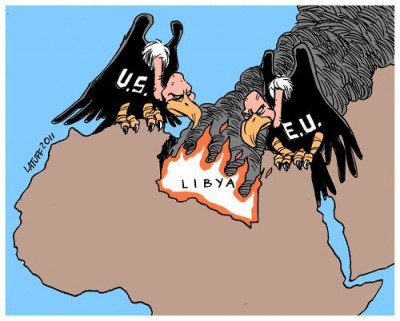The Ides of March 2011: NATO’s ‘Humanitarian’ War on Libya
With guests Abayomi Azikiwe and Mahdi Darius Nazemroaya

“This is injustice, it is clear aggression, and it is uncalculated risk for its consequences on the Mediterranean and Europe…We are confronting Al Qaeda in the Islamic Maghreb, nothing more. What would you do if you found them controlling American cities with the power of weapons? Tell me how would you behave, so that I could follow your example?”
– Col Muammar Gaddafi, speaking to President Obama by letter in March 2011 [1]
LISTEN TO THE SHOW
Click to download the audio (MP3 format)
A French plane, one of twenty in the Libyan region, attacked and destroyed its first target at 1645 GMT on March 19, 2011. [2]
These were soon joined by British fighter jets and US cruise missiles.[3]
Framed as enforcing a No-Fly zone authorized by the UN Security Council, the targets of these attacks were predominantly tanks and armoured vehicles, at least according to a spokesperson for the French Defense Ministry. Within days, these fighting forces merged under the command of NATO Allied Joint Force Command in Naples, along with the arms embargo against Libya under the name Operation Unified Protector.[4][5]
The coalition soon expanded to encompass nineteen other partners including Belgium, Bulgaria, Canada, Denmark, Greece, Italy, Jordan, the Netherlands, Norway, Qatar, Romania, Spain, Sweden, Turkey, and the United Arab Emirates. For seven months, according to Global Security, this crusade by these “Guardians of Humanitarianism” punched Libya with 26,500 sorties, including over 9,700 strike sorties. [6]
According to Julien Teil, film-maker of the documentary film “The Humanitarian War,” the military action on the part of NATO was launched in response to an initiative of the Benghazi based Libyan League for Human Rights and their head Soliman Bouchuiguir, accusing Colonel Muammar Gaddafi of human rights violations.
This initiative led to a petition signed by 70 Non-Governmental Organizations (NGOs) demanding the U.S., EU, and the UN to:
“mobilize the United Nations and the international community and take immediate action to halt the mass atrocities now being perpetrated by the Libyan government against its own people.”
This is what set in motion a process of military intervention under the pretext of the “Responsibility to Protect.”[7]
At the time Gadaffi was killed gruesomely by counter-revolutionaries, Libya had the highest GDP per capita on the continent, with fewer people below the poverty line than in the Netherlands.
Today, according to a study from the United Nations Office for Community Health Affairs, Libya is suffering a major humanitarian crisis. In a population with 7.4 million people, 1.3 million are in need of humanitarian assistance, with 700,000 of them needing food assistance.[8][9]
On the 10th anniversary of the launching of this war, the Global Research News Hour will attempt to decipher the REAL reasons for the invasion of Libya, taking a more detailed look at what has happened to it since, and what this could mean for the future of the country, and the African continent.
In our first half hour, we hear back from a long-time correspondent, Abayomi Azikiwe. He breaks down the true motives of the assault, the historical legacy of Muammar Gaddafi, and how the shattering of Libya will impact the broader African community.
In our second half, we have another long-timer joining us…Mahdi Darius Nazemroaya! The man was in Libya during the height of the war almost ten years ago. Following a replay of a former interview conducted by CKUW colleague Scott Price, we hear a more recent conversation in which he reflects on the humanitarian forces driving the war, the treatment of the Black African migrant situation, and of his cherished memories of the people he met there, and his positive outlook for the future.
Abayomi Azikiwe is the editor of Pan-African News Wire, and has appeared as a commentator on several media outlets. He is also a frequent contributor to Global Research.
Mahdi Darius Nazemroaya is an interdisciplinary sociologist and an award-winning author and geopolitical analyst, and author of The Globalization of NATO (Clarity Press) and a forthcoming book The War on Libya and the Re-Colonization of Africa. He is a Sociologist and Research Associate at the Centre for Research on Globalization (CRG), a contributor to the Strategic Culture Foundation (SCF) and a member of the Scientific Committee of Geopolitica, Italy.
(Global Research News Hour Episode 309)
LISTEN TO THE SHOW
Click to download the audio (MP3 format)
The Global Research News Hour airs every Friday at 1pm CT on CKUW 95.9FM out of the University of Winnipeg. The programme is also podcast at globalresearch.ca .
Other stations airing the show:
CJSF 90.1 FM from the Burnaby mountain campus of Simon Fraser University at 90.1 FM to most of Greater Vancouver, from Langley to Point Grey and from the North Shore to the US Border, through MP3 streaming and through a speaker located just outside the station. The show airs Thursdays at 9am local time.
CIXX 106.9 FM, broadcasting from Fanshawe College in London, Ontario. It airs Sundays at 6am.
WZBC 90.3 FM in Newton Massachusetts is Boston College Radio and broadcasts to the greater Boston area. The Global Research News Hour airs during Truth and Justice Radio which starts Sunday at 6am.
Campus and community radio CFMH 107.3fm in Saint John, N.B. airs the Global Research News Hour Fridays at 7pm.
CJMP 90.1 FM, Powell River Community Radio, airs the Global Research News Hour every Saturday at 8am.
Caper Radio CJBU 107.3FM in Sydney, Cape Breton, Nova Scotia airs the Global Research News Hour starting Wednesday afternoon from 3-4pm.
Cowichan Valley Community Radio CICV 98.7 FM serving the Cowichan Lake area of Vancouver Island, BC airs the program Thursdays at 9am pacific time.
Notes:
- www.ndtv.com/world-news/libya-us-and-allies-continue-air-assault-on-gaddafis-forces-450533
- www.bbc.com/news/world-africa-12795971
- ibid
- ibid
- NATO No-Fly Zone over Libya Operation UNIFIED PROTECTOR, NATO; www.nato.int/nato_static/assets/pdf/pdf_2011_03/20110325_110325-unified-protector-no-fly-zone.pdf
- www.globalsecurity.org/military/world/war/unified-protector.htm
- mises.org/library/humanitarian-wars-and-their-ngo-foot-soldiers
- www.telesurenglish.net/analysis/Libya-Before-and-After-Muammar-Gaddafi-20200115-0011.html
- Humanitarian Needs Overview: Libya (December 2020), UNOCHA; www.telesurenglish.net/analysis/Libya-Before-and-After-Muammar-Gaddafi-20200115-0011.html

